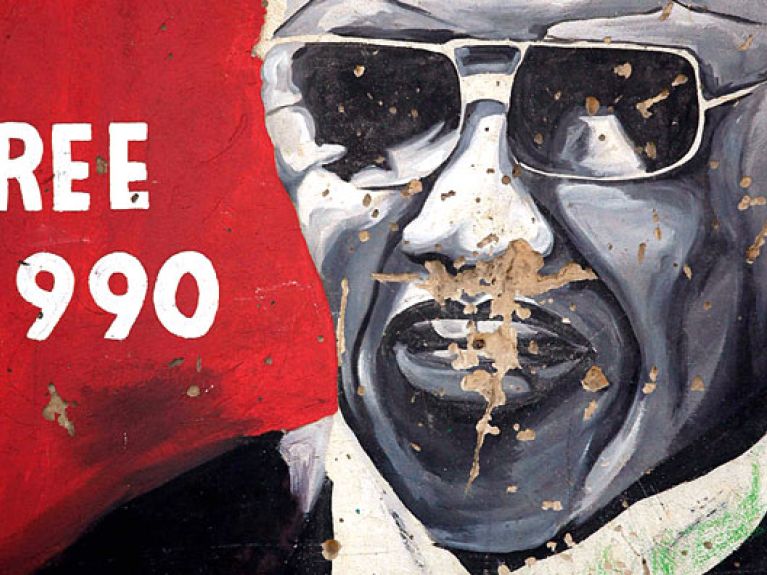A time of great upheaval
For Africa, the fall of the Berlin Wall and German reunification also represent a time of upheaval in terms of independence and democracy.

The fall of the Berlin Wall in 1989 was an event of global dimensions which marked the end of the Cold War. A time of upheaval also began in Africa, above all in Southern Africa. Nelson Mandela’s release from prison in February 1990 after long years of incarceration constituted an important step towards abolishing the racist apartheid regime in South Africa. Namibia, the former colony of German South-West Africa, was governed after the First World War by South Africa as a League of Nations mandate territory and later as a colony, before achieving independence in 1990 after a long struggle against South African rule. The fall of the Wall provided an important framework for these events in Southern Africa but it was not the only or most important factor in the dissolution of the apartheid regime and in Namibian independence.
Post-1990, Namibia did not initially enjoy a particularly high profile in German politics or the media. A good decade ago, however, the country briefly hit the headlines in Germany. The occasion was the 100th anniversary in 2004 of the Herero Uprising. This was when the Herero ethnic group, and later also the Nama in Namibia, rose up against the German colonial rulers. The latter responded with great brutality, and only some 16,000 of the original 60,000 to 80,000 Herero survived the colonial war. Many historians regard this as the first genocide of the twentieth century. During a visit to Namibia in 2004, Heidemarie Wieczorek-Zeul, the then minister for economic cooperation and development, asked for forgiveness for the crimes of the German troops and admitted: “The atrocities committed at that time were what one would nowadays term genocide – for which a General von Trotha would these days be brought before a court and convicted.“ Ever since Namibia’s independence in 1990, Germany has been supporting the country with aid payments – to the tune of 77.7 million euros in 2013/2014. Many Herero and Nama continue to demand official acknowledgement from the German government that the colonial war constituted a genocide and call for a formal apology.
The end of apartheid and the establishment of a “new South Africa” were followed with close attention in Germany. Nelson Mandela gained worldwide status as one of the century‘s most admired individuals. The founding by Nelson Mandela of a Truth and Reconciliation Commission attracted particular interest. It documented the injustice of humiliation and the everyday brutality of the apartheid state, without establishing a policy of state-sanctioned revenge. Although this instrument was much admired in Germany and sparked debates, it was rarely talked about in the direct context of dealing with the crimes of National Socialism beyond more general discussions of a “critical engagement with the past”. The Commission’s work is viewed with growing scepticism in South Africa because those who enforced apartheid were in some cases granted amnesties by the Truth and Reconciliation Commission.
Today South Africa is Germany’s most important partner south of the Sahara, many German companies maintaining a presence there. At the same time, there is close cultural and academic cooperation, though also increasing criticism of the governing ANC party, which Germany accuses of being slow to implement the necessary reforms and not taking steps to lastingly combat corruption.
PROFESSOR ANDREAS ECKERT teaches African history at Humboldt-Universität zu Berlin.
